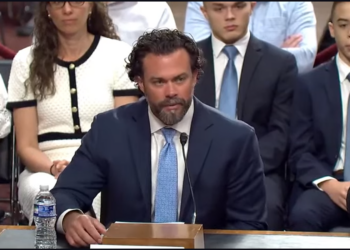The Trump administration hopes to use a program for expediting federal permitting launched during the Obama administration to strengthen the domestic supply of critical minerals. The move would aim to prevent China from dominating key industries, such as weapons manufacturing and electric vehicles.
Critical minerals are essential to the defense and energy sectors. However, the United States relies on China and other foreign countries to mine and process minerals. China dominates the supply chain, producing 60% of global critical minerals and accounting for 85% of the world’s processing capacity.
China has leveraged its dominance in critical minerals and rare earths in response to President Donald Trump’s sweeping tariffs on all Chinese goods.
U.S. and Chinese trade officials concluded trade talks earlier this week to address Beijing’s control over critical minerals and rare earths. The export restrictions have prompted major automakers to consider relocating auto parts manufacturing to China.
To counter China, the Trump administration is using the Fixing America’s Surface Transportation Act, also known as FAST-41, to boost the domestic production of critical minerals. This federal program, which began during former President Barack Obama’s second term, helps streamline the permitting process for critical infrastructure projects.
The Permitting Council oversees the program, which covers about 19 economic sectors, including transportation, semiconductors, and renewable energy. The program was not expanded to include mining until the Biden administration. Now, the program includes six mining projects, five of which were added this year.
Mining is of particular concern because critical minerals are needed to build electric vehicles, wind turbines, solar panels, grid storage, and nuclear power. In other words, they are key to advancing the energy sector, which faces an enormous ramp-up in demand in the coming years from manufacturing and artificial intelligence.
For instance, the critical mineral graphite is an input for lithium-ion batteries in EVs, electronics, and energy storage systems. Minerals are also required for aircraft, helicopters, and missile components in the defense sector.
Graphite One is one of six mining companies approved for the FAST-41 program. Graphite One plans to build a complete supply chain of graphite in Alaska, from upstream mining to midstream processing and the production of lithium-ion battery anode materials and other graphite products for the U.S. market.
The FAST-41 program, which established the 16-member Permitting Council, helps to guide infrastructure projects such as mining through the permitting process by collaborating with various federal agencies and establishing strict deadlines.
Dan McGroarty, a Graphite One advisory board member, told the Washington Examiner that FAST-41 is about “transparency” and “predictability.”
“Uncertainty is really the enemy of investment,” McGroarty said, adding that the program “maps the permitting steps.”
The success of a company like Graphite One would be a major step toward domestic self-reliance. The U.S. does not have a complete and self-sufficient supply chain for critical minerals and rare earths.
“It’s a big deal to try to recreate the entire supply chain,” McGroarty said.
The FAST-41 program is thought to be crucial for accelerating projects like Graphite One. It often takes years for a mine to start operating due to legal challenges and bureaucratic hurdles, including the need to secure federal permits and undergo environmental reviews from various agencies.
Emily Domenech, the newly appointed head of the council, said it could take 29 years to start a mine operating in the U.S. Domenech described the Permitting Council as a “sherpa” for businesses seeking to initiate projects.
“My goal would be to move as many projects to construction in the first two years of the Trump administration as is humanly possible,” Domenech told the Washington Examiner earlier this month.
NEW TRUMP PERMITTING COUNCIL HEAD HOPES TO MAKE AGENCY UNNECESSARY
The FAST-41 program has two functions: covered projects and transparency projects.
Covered projects will receive the complete services of the FAST-41 program to simplify their permitting process. Transparency projects do not benefit from the full range of services the program offers. Yet, they are still included in the program’s dashboard, allowing the public and private sectors to monitor their progress.
Domenech said the transparency function includes 25 critical minerals projects.
“It’s not sort of the full-service sherpa that you get out of the FAST-41 process, but it’s a great way to, frankly, leverage all of the incredible expertise we have at the permitting council to ensure that we can move this stuff forward without wasting any time,” Domenech said.
She expects the council to add more projects to the transparency function and noted that fast-tracking critical projects has bipartisan support, specifically when it comes to competing with U.S. adversaries like China.
Democrats “recognize that the federal government has become a hurdle to building in the United States and that there’s no way that we will ever compete with China if the government is stopping people from building,” she said.
“We talk about it all the time — how quickly China can ramp up their industries,” Domenech said.
There is bipartisan recognition that “we need to use all the tools we can” to accelerate permitting to compete with the unilateral power the Chinese government has to launch projects.
U.S. Critical Materials is an exploration and development company seeking to join the FAST-41 program for its rare earth mining project in Montana. The company seeks to extract and process rare earth elements.
Harvey Kaye, the Director of U.S. Critical Materials, said that mining domestic critical minerals is crucial for U.S. national security, particularly because of its reliance on China.
TRUMP SAYS CHINA TRADE DEAL IS ‘DONE’ WITH TARIFFS SET AT 55%
“We want to stand on the steps of the White House, and we would say, ‘Mr. President, it’s here in America. It’s processed in America, and you do not have to bend the knee to China,’” Kaye said.
Kaye said it will take several years to compete with China, adding that “we cannot be in the position where we are today.”
Callie Patteson contributed to this report.
















